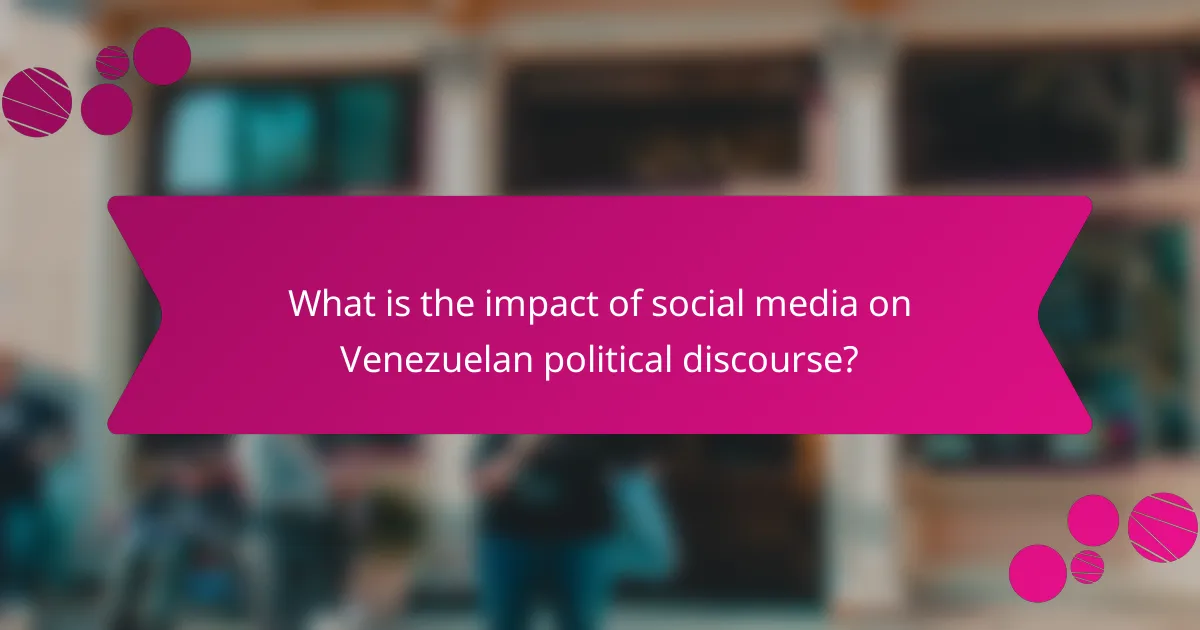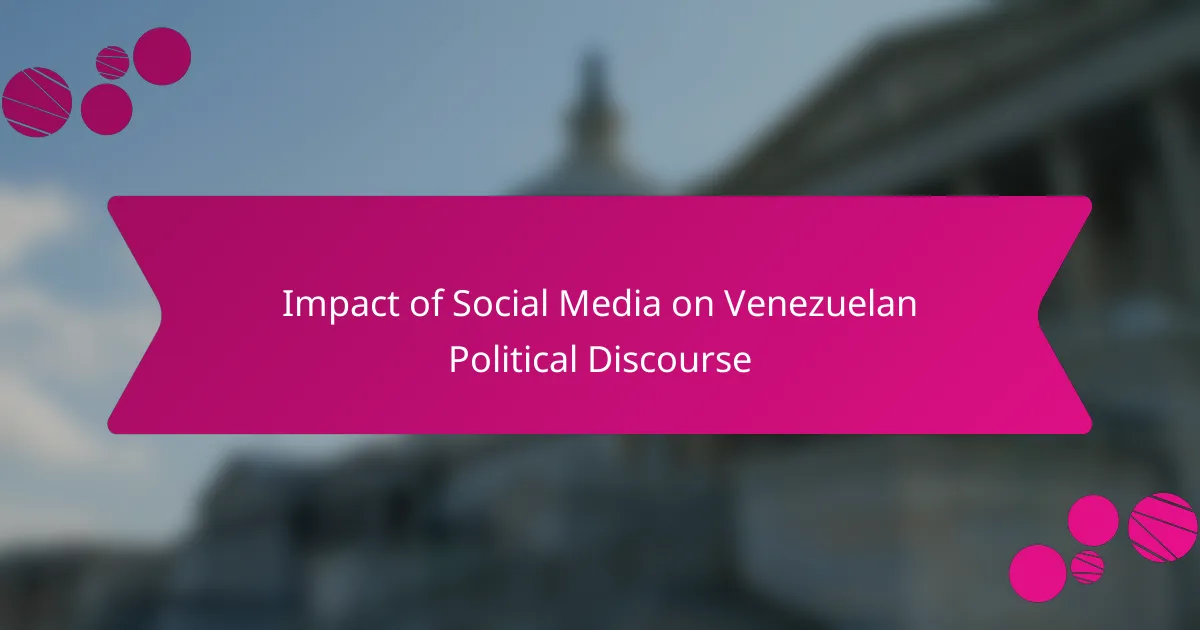
What is the impact of social media on Venezuelan political discourse?
Social media significantly influences Venezuelan political discourse. It serves as a platform for citizens to express opinions and mobilize support. Social media facilitates the rapid dissemination of information. It also allows for the organization of protests and political movements. In Venezuela, platforms like Twitter and Facebook have become crucial for opposition groups. They enable users to bypass state-controlled media. This dynamic fosters a space for alternative narratives. Research indicates that social media has increased political engagement among Venezuelans. According to a 2021 study by the University of Caracas, 70% of Venezuelans use social media for political news. This shift has transformed traditional political communication in the country.
How has social media transformed political engagement in Venezuela?
Social media has significantly transformed political engagement in Venezuela by facilitating communication and mobilization among citizens. Platforms like Twitter and Facebook have become essential tools for sharing information and organizing protests. These platforms allow users to bypass traditional media, which is often state-controlled. In 2014, social media played a crucial role during the protests against President Nicolás Maduro. Activists used these channels to disseminate real-time updates and coordinate actions. The Venezuelan government has responded with censorship and internet restrictions, highlighting the power of social media in shaping political discourse. Studies indicate that social media has increased political awareness and participation among young Venezuelans. This transformation has made it easier for opposition groups to unite and challenge the government.
What platforms are most influential in shaping political conversations?
Social media platforms are the most influential in shaping political conversations. Platforms like Twitter, Facebook, and Instagram facilitate real-time discussions. They allow users to share news, opinions, and engage with political content. In Venezuela, Twitter is particularly significant for political discourse. It enables citizens to express dissent and organize protests. Facebook serves as a space for community building and mobilization. Instagram, while visual, conveys political messages through imagery and stories. Research indicates that these platforms shape public opinion and political engagement. Studies show that digital communication can influence voter behavior and political awareness.
How do Venezuelans utilize social media for political activism?
Venezuelans utilize social media as a tool for political activism by sharing information and mobilizing support. They use platforms like Twitter, Facebook, and Instagram to organize protests and disseminate news. This approach allows for real-time communication among activists. Social media serves as a space for critical discussion and dissent against the government. It also helps bypass state-controlled media, providing alternative narratives. For instance, during the 2014 protests, social media was crucial for coordinating demonstrations. Studies show that social media engagement correlates with increased political participation among Venezuelans.
What role does social media play in the dissemination of political information?
Social media serves as a crucial platform for the dissemination of political information. It allows for rapid sharing of news and opinions among users. In Venezuela, platforms like Twitter and Facebook have become essential for political communication. Users often rely on social media for real-time updates during political events. This medium enables grassroots movements to organize and mobilize quickly. Research indicates that social media can influence public opinion and voter behavior significantly. A study by the Pew Research Center found that 64% of adults use social media to engage with political content. Thus, social media has transformed traditional political discourse, making it more accessible and immediate.
How does social media influence public opinion on political issues?
Social media significantly influences public opinion on political issues by facilitating rapid information dissemination. Platforms like Twitter and Facebook allow users to share news and opinions instantly. This immediacy can shape perceptions and attitudes towards political events. Research shows that social media can amplify partisan viewpoints, creating echo chambers. For example, a study by the Pew Research Center found that 62% of adults get news from social media. This reliance on social media can lead to misinformation spreading quickly. Additionally, social media campaigns can mobilize public support or opposition effectively. In Venezuela, social media has been crucial in organizing protests and raising awareness about political issues.
What are the challenges of misinformation on social media in Venezuela?
Misinformation on social media in Venezuela poses significant challenges to public discourse and political stability. It undermines trust in legitimate news sources. The government has been known to spread false narratives to control the narrative. This creates confusion among citizens regarding political events and policies. Social media platforms often lack effective moderation to combat false information. As a result, misleading content can spread rapidly. Citizens may make decisions based on inaccurate information, affecting elections and public opinion. The prevalence of misinformation can exacerbate social tensions and political polarization.
How does social media affect political polarization in Venezuela?
Social media significantly contributes to political polarization in Venezuela. It facilitates the spread of partisan information. Users often engage with content that reinforces their existing beliefs. This creates echo chambers, limiting exposure to diverse viewpoints. According to research by the University of Los Andes, social media use correlates with increased ideological division. The platform dynamics encourage extreme rhetoric and divisive narratives. Consequently, political discourse becomes more confrontational. This intensifies the existing divides within Venezuelan society.
What are the indicators of increased polarization among Venezuelan users?
Increased polarization among Venezuelan users is indicated by the escalation of extreme political rhetoric. This includes the rise in hostile language and personal attacks on social media platforms. Users increasingly align with polarized political factions, reducing engagement with opposing views. Data shows a significant increase in echo chambers, where users only interact with like-minded individuals. The frequency of misinformation and propaganda also contributes to this polarization. Studies indicate that emotional content, such as outrage or fear, is more likely to be shared, further entrenching divisions. Additionally, the number of social media groups dedicated to specific political ideologies has surged. These factors collectively highlight the growing divide in Venezuelan political discourse.
How do echo chambers form in Venezuelan social media environments?
Echo chambers in Venezuelan social media environments form through selective exposure to information. Users often follow accounts that align with their political beliefs. This creates a feedback loop where similar viewpoints are reinforced. Algorithms on social media platforms further amplify these preferences. They prioritize content that matches user interests, limiting diverse perspectives. Additionally, political polarization in Venezuela contributes to these echo chambers. Users may avoid dissenting opinions due to fear of backlash or harassment. Research indicates that echo chambers can lead to increased radicalization and misinformation. These dynamics significantly impact political discourse in the country.
What are the implications of social media for political participation in Venezuela?
Social media significantly influences political participation in Venezuela. It serves as a platform for citizens to express dissent and mobilize against the government. During protests, social media has facilitated real-time communication and coordination among activists. Additionally, it provides an avenue for sharing information that might be censored in traditional media. Reports indicate that platforms like Twitter and Facebook have been crucial for organizing demonstrations. Furthermore, social media allows for the dissemination of alternative narratives. This counters state-controlled media, which often presents a biased view. Consequently, social media has become an essential tool for political engagement in Venezuela.
How does social media mobilize voters during elections?
Social media mobilizes voters during elections by facilitating communication and engagement. It allows candidates to reach a broad audience quickly. Platforms like Twitter and Facebook enable real-time updates and interactions. Voters can share information and rally support easily. Social media also provides a space for grassroots organizing. According to a study by the Pew Research Center, 69% of adults use social media, influencing their political views. This engagement can lead to increased voter turnout. In Venezuela, social media has played a crucial role in political movements and discourse.
What barriers exist for political participation through social media?
Barriers for political participation through social media include digital divide, misinformation, and censorship. The digital divide limits access to technology and the internet. In Venezuela, many citizens lack reliable internet, hindering their participation. Misinformation spreads rapidly on social media, confusing users about political issues. This can deter informed engagement. Censorship by the government restricts free expression online. Reports indicate that platforms are often blocked or monitored in Venezuela. These factors collectively undermine the potential for meaningful political discourse through social media.
How can social media strategies enhance political discourse in Venezuela?
Social media strategies can enhance political discourse in Venezuela by facilitating open communication. They allow citizens to express opinions freely and engage in discussions. Platforms like Twitter and Facebook enable real-time interaction among users. This immediacy fosters a dynamic exchange of ideas. Additionally, social media can mobilize citizens around political causes. Campaigns can spread quickly, garnering support and raising awareness. Evidence shows that social media played a crucial role in the protests during 2014 and 2017. These platforms also provide alternative news sources, countering state-controlled media narratives. Overall, social media strategies create a more participatory political environment.
What best practices can political entities adopt for effective communication on social media?
Political entities can adopt several best practices for effective communication on social media. First, they should ensure transparency in their messaging. Clear and honest communication builds trust with the audience. Second, engaging with followers is crucial. Responding to comments and messages fosters community interaction. Third, consistency in posting is important. Regular updates keep the audience informed and engaged. Fourth, utilizing multimedia content enhances message delivery. Videos and images can increase engagement rates significantly. Fifth, analyzing engagement metrics helps refine strategies. Understanding what content resonates allows for better-targeted messaging. Lastly, adhering to platform-specific guidelines ensures compliance and maximizes reach. These practices contribute to a more effective social media presence for political entities.
How can citizens leverage social media for positive political change?
Citizens can leverage social media for positive political change by using it to organize, inform, and mobilize. They can create awareness about political issues through posts and shares. Social media platforms allow for real-time communication and engagement. Citizens can form online communities to discuss and strategize actions. They can also use hashtags to amplify their messages and connect with broader movements. Research shows that digital activism can lead to significant political mobilization, as seen in various global movements. In Venezuela, social media has played a crucial role in raising awareness about government actions and human rights violations. By sharing credible information, citizens can counter misinformation and promote transparency.
The main entity of this article is the impact of social media on Venezuelan political discourse. Social media platforms, particularly Twitter and Facebook, play a crucial role in shaping political engagement, enabling citizens to express dissent, mobilize support, and disseminate information in a context often dominated by state-controlled media. The article examines how social media has transformed political participation, facilitated the organization of protests, and influenced public opinion, while also addressing challenges such as misinformation and political polarization. Key insights include the role of social media in increasing political awareness and participation among Venezuelans, as well as strategies for enhancing discourse and engagement through effective communication practices.
